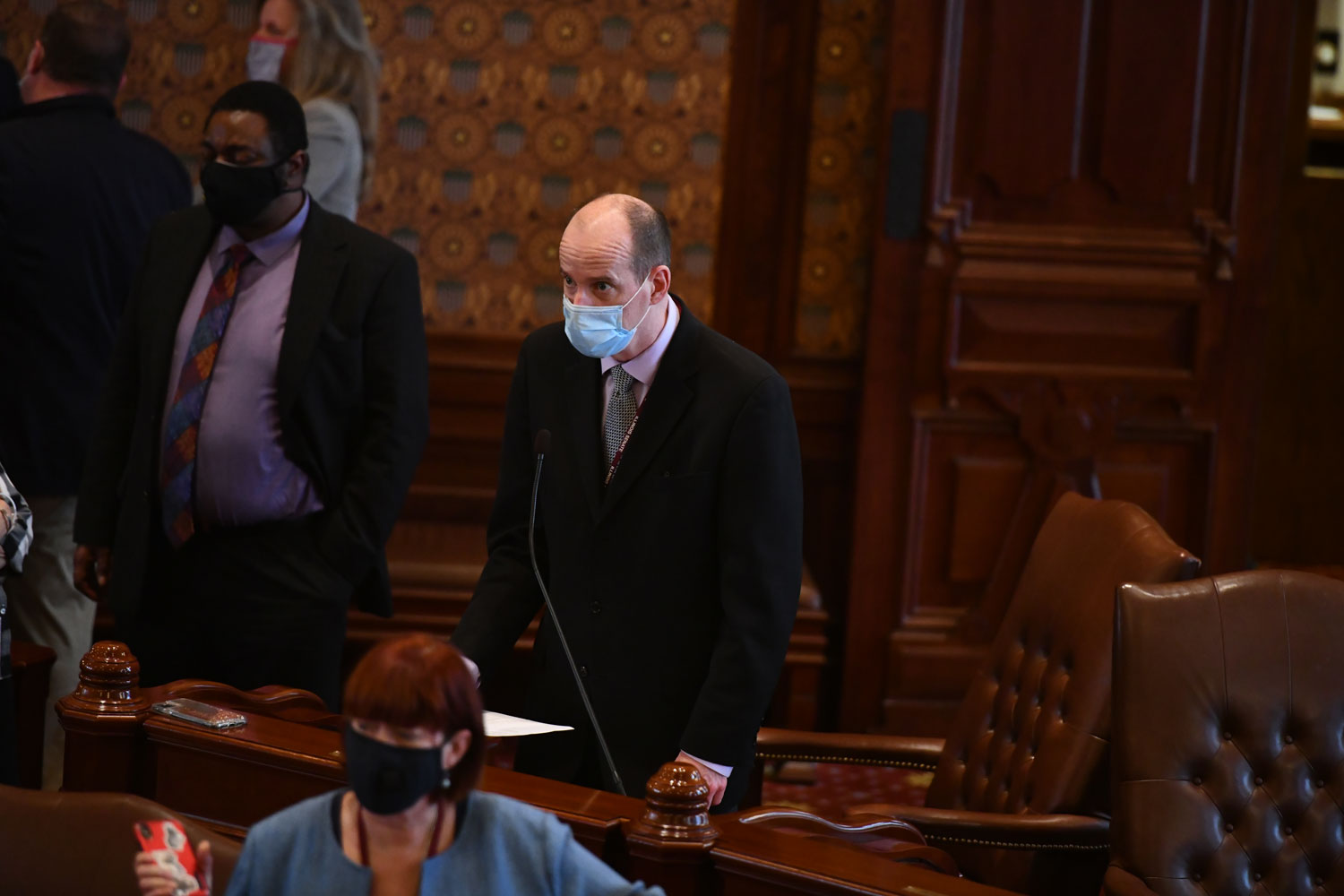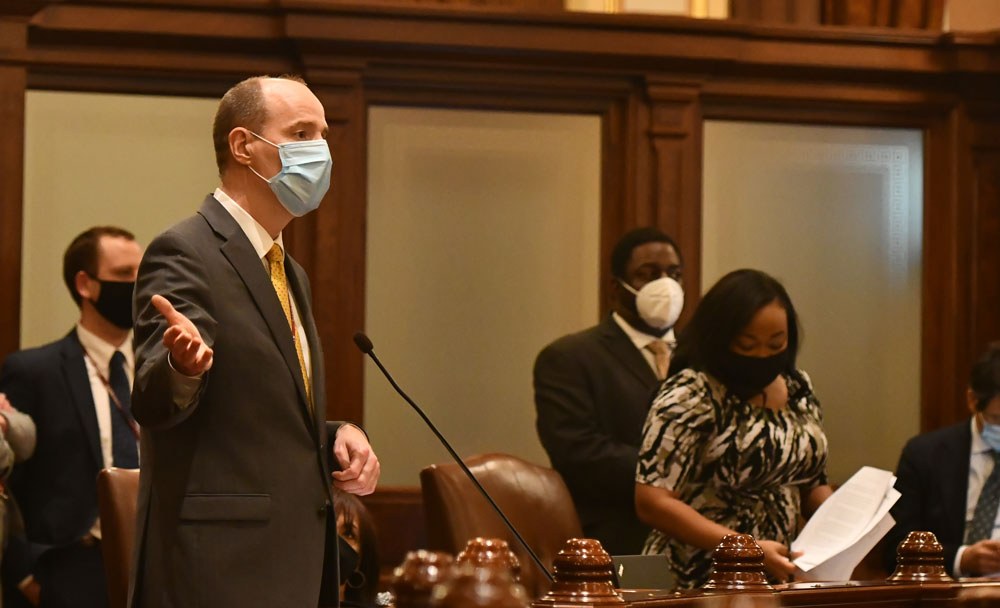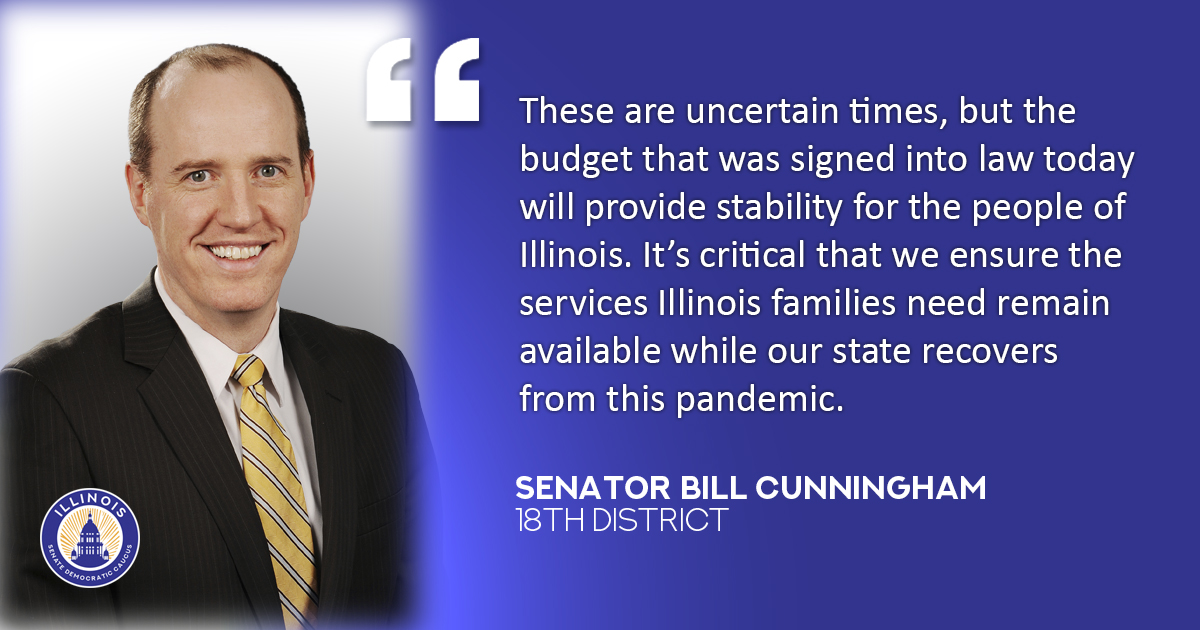- Details
- Category: Press Releases
 CHICAGO – Shortly after taking his seat in the Illinois Senate in 2013, Senator Bill Cunningham introduced legislation requiring the city of Chicago to dedicate future revenue from a proposed casino to the city’s financially strapped police and fire pension funds. At the time, the thought of Chicago ever getting legislative approval to open a casino seemed like a distant and remote possibility.
CHICAGO – Shortly after taking his seat in the Illinois Senate in 2013, Senator Bill Cunningham introduced legislation requiring the city of Chicago to dedicate future revenue from a proposed casino to the city’s financially strapped police and fire pension funds. At the time, the thought of Chicago ever getting legislative approval to open a casino seemed like a distant and remote possibility.
That possibility became a reality last week when Cunningham, serving as chief sponsor, helped push Senate Bill 516 through the General Assembly. The legislation made a number of changes to the state’s gaming laws and will enable Chicago to open its long-sought casino. When fully operational, the casino is expected to funnel more than $200 million dollars a year to Chicago’s police and fire pension funds.
“The idea of a Chicago casino was purely hypothetical in 2013, and some were convinced it would never happen,” said Cunningham, a Democrat who represents portions of Chicago and the southwest subrubs. “But we knew that was the best time to put a marker down, before a fight began over how to spend the money. If the casino ever opened, we didn’t want to see the new revenue going to newly created programs, not when the city owed billions of dollars to its pension funds.”
As chief sponsor of SB 516, Cunningham was able to ensure the intent of his 2013 legislation remained in the law. The measure passed both the Senate and House with comfortable, bipartisan majorities. As a result, the taxes collected by the city on all slot machines and table games in the new casino will go exclusively to Chicago’s police and fire pensions.
“This massive new revenue source won’t solve the pension funding crisis overnight,” Cunningham said. “But it is a big step in the right direction. And best of all, the new casino dollars will reduce the pressure placed on Chicago property taxes, which until now has been the only source of revenue for the police and fire pension funds.”
SB 516 is expected to be signed into law by Governor JB Pritzker in the coming weeks.
- Details
- Category: Press Releases
 SPRINGFIELD – State Senator Bill Cunningham passed legislation Saturday to help bring a casino to the city of Chicago that would pump millions of dollars into the city’s police and fire pension funds.
SPRINGFIELD – State Senator Bill Cunningham passed legislation Saturday to help bring a casino to the city of Chicago that would pump millions of dollars into the city’s police and fire pension funds.
“Bringing a casino to Chicago will provide a major economic boost to the entire region,” said Cunningham, a Democrat who represents portions of Chicago and the southwest suburbs. “At a time when we’re dealing with the economic fallout from the COVID-19 pandemic, this project will be critical to the recovery of the city and the surrounding area. In addition to providing much-needed funds for our city and state, the project will create thousands of jobs at a time when we’re seeing unprecedented levels of unemployment due to COVID-19.”
Last year, the Illinois General Assembly approved a $45 billion infrastructure improvement plan that included a provision allowing a casino to operate in the city of Chicago. However, challenges posed by the tax rate in the law meant operating a casino in the city didn’t make economic sense.
Some tax revenue from the casino would be dedicated to supporting the pension funds for Chicago’s police and firefighters.
“The revenue this casino will provide will help make sure our police and firefighters get the retirement they’ve earned,” Cunningham said. “It’s essential that we get this project off the ground as soon as possible, so it can start providing that additional support.”
- Details
- Category: Press Releases

“The budget we passed this evening represents stability in a time of uncertainty for the people of Illinois. It preserves critical services when Illinoisans need them most.
“I’m particularly pleased to see that this budget contains an additional investment of $59.2 million in the Illinois Department of Employment Security, which administers our state’s unemployment insurance program. During this crisis, we have seen an unprecedented number of unemployment claims filed, and it’s critical that we ensure IDES has the resources necessary to deal with them. This added funding will be vital to protecting Illinoisans displaced by the pandemic.
“This budget also includes a significant increase in funding for the Illinois Department of Public Health, in part thanks to the federal CARES Act. This will be critical to assisting our public officials as they continue to protect us during this crisis.”
- Details
- Category: Press Releases
 SPRINGFIELD – A measure cosponsored by State Senator Bill Cunningham that would expand protections and eligibility for benefits for first responders and other essential employees during the COVID-19 pandemic passed the Illinois Senate Thursday.
SPRINGFIELD – A measure cosponsored by State Senator Bill Cunningham that would expand protections and eligibility for benefits for first responders and other essential employees during the COVID-19 pandemic passed the Illinois Senate Thursday.
“These men and women are putting themselves at great risk to provide us with the critical services we need during this pandemic,” said Cunningham, a Democrat who represents portions of Chicago and the southwest suburbs. “We need to ensure that they have adequate protections should they get sick as a result of their work.”
Though worker’s compensation does not normally cover illness, these are not normal times. Senate Bill 2455 allows employees to qualify for workers’ compensation benefits if the they contract COVID-19.
More Articles …
Page 30 of 86



